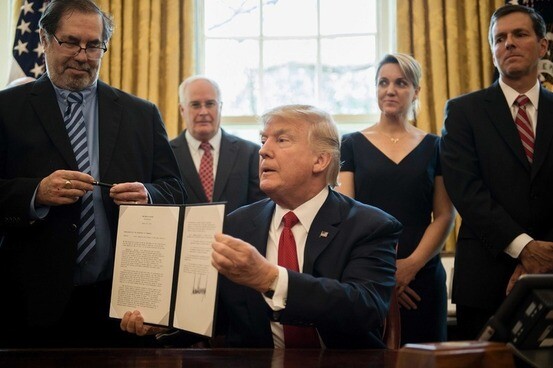hankyoreh
Links to other country sites 다른 나라 사이트 링크
[Editorial] Does Trump truly regard South Korea as an ally?

On Feb. 16, the US Department of Commerce included South Korea on a list of 12 countries that may be subjected to steep tariffs aimed at protecting the American steel industry as part of an investigation into steel imports under Article 232 of the Trade Expansion Act. The Commerce Department argued that steel must be produced domestically as a material needed for maintaining key national infrastructure and that achieving this necessitates blocking excessive steel imports.
One of the three options the Department recommended for regulating imports was to impose a tariff of 53% on steel imported by 12 countries, including China and South Korea. Some of the major exporters of steel to the US, including Canada, Japan and Germany, were excluded from the measure. Although the US did not disclose the criteria used to compose this list, analysts at South Korea’s Ministry of Trade, Industry and Energy said that “it seems to include countries that both export a lot to the US and import a lot of [cheap] Chinese steel.”
Given the “trade pressure” that the US has been imposing recently, it is doubtful whether the Trump administration considers South Korea to be a true ally. Last month, the Trump administration activated a safeguard that imposes tariffs as high as 50% on South Korean washing machines and solar panels. On Feb. 12, Trump singled out South Korea, China and Japan as countries that had “gotten away with murder for 25 years” while mentioning a type of retributive tariff known as a “reciprocal tax.”
During a meeting about fair trade at the White House on Feb. 13, Trump described the Korea-US Free Trade Agreement as a disaster. He also welcomed GM Korea’s announcement of plans to shutter its factory in Gunsan, even making the unverified claim that GM would be returning to Detroit. Trump does not seem to care at all about the position of workers who may be about to lose their jobs or about the government of its ally, which is worried about the closure of the factory.
While the Trump administration takes every opportunity to launch attacks about the trade imbalance between South Korea and the US in the manufacturing sector, it disregards the fact that the US has a much greater surplus in the balance on services. Meanwhile, Trump behaves with overt arrogance, making rude remarks without showing any concern for South Korea.
Since the two countries fought side by side in several wars, they are sometimes referred to as “blood brothers.” Even today, the bond between them is absolute when it comes to the US strategy in East Asia and affairs on the Korean Peninsula, including the North Korean nuclear program. South Korea and the US share interests related to both security and the economy, and they are not in a zero-sum relationship.
Even if South Korea bends over backward and concedes that there is a problem with trade with the US, this is a matter for thoughtful discussion between the two sides. What does Trump possibly hope to gain from such aggressive posturing and from the use of such crude language? Can a country that behaves in such a way really be called an ally?
Please direct questions or comments to [english@hani.co.kr]

Editorial・opinion
![[Column] Season 2 of special prosecutor probe may be coming to Korea soon [Column] Season 2 of special prosecutor probe may be coming to Korea soon](https://flexible.img.hani.co.kr/flexible/normal/500/300/imgdb/original/2024/0426/3317141030699447.jpg) [Column] Season 2 of special prosecutor probe may be coming to Korea soon
[Column] Season 2 of special prosecutor probe may be coming to Korea soon![[Column] Park Geun-hye déjà vu in Yoon Suk-yeol [Column] Park Geun-hye déjà vu in Yoon Suk-yeol](https://flexible.img.hani.co.kr/flexible/normal/500/300/imgdb/original/2024/0424/651713945113788.jpg) [Column] Park Geun-hye déjà vu in Yoon Suk-yeol
[Column] Park Geun-hye déjà vu in Yoon Suk-yeol- [Editorial] New weight of N. Korea’s nuclear threats makes dialogue all the more urgent
- [Guest essay] The real reason Korea’s new right wants to dub Rhee a founding father
- [Column] ‘Choson’: Is it time we start referring to N. Korea in its own terms?
- [Editorial] Japan’s rewriting of history with Korea has gone too far
- [Column] The president’s questionable capacity for dialogue
- [Column] Are chaebol firms just pizza pies for families to divvy up as they please?
- [Column] Has Korea, too, crossed the Rubicon on China?
- [Correspondent’s column] In Japan’s alliance with US, echoes of its past alliances with UK
Most viewed articles
- 1Samsung subcontractor worker commits suicide from work stress
- 2‘We must say no’: Seoul defense chief on Korean, USFK involvement in hypothetical Taiwan crisis
- 3Is Japan about to snatch control of Line messenger from Korea’s Naver?
- 4Division commander ordered troops to enter raging flood waters before Marine died, survivor says
- 5[Editorial] Korea’s surprise Q1 growth requires objective assessment, not blind fanfare
- 6No good, very bad game for Korea puts it out of Olympics for first time since 1988
- 7US overtakes China as Korea’s top export market, prompting trade sanction jitters
- 8Korea’s 1.3% growth in Q1 signals ‘textbook’ return to growth, says government
- 9N. Korean delegation’s trip to Iran shows how Pyongyang is leveraging ties with Moscow
- 10[Column] Season 2 of special prosecutor probe may be coming to Korea soon